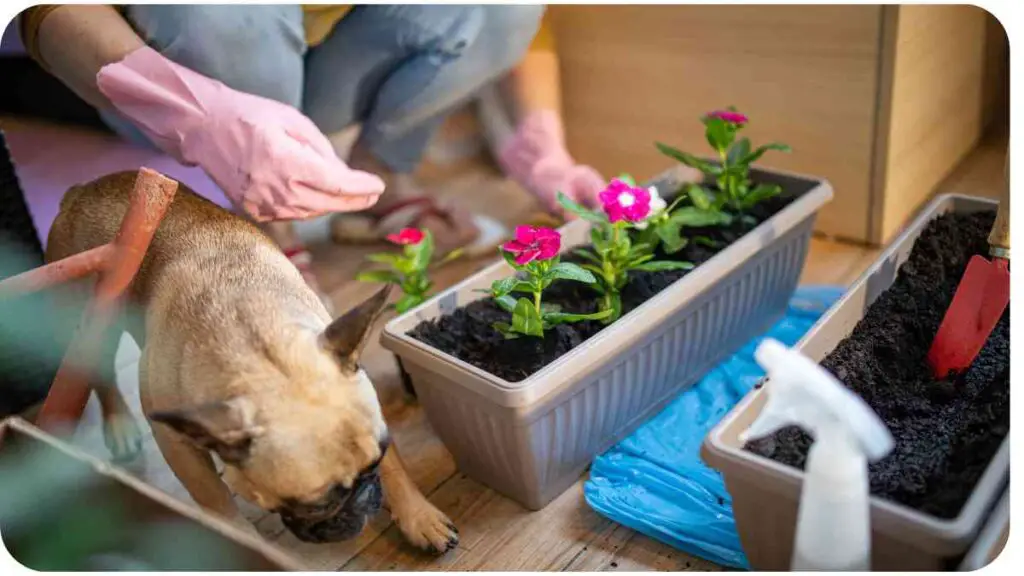Keeping dogs out of house plants can be a challenge for many pet owners. Dogs are naturally curious and sometimes their curiosity turns into a playful romp through your greenery. If you’ve ever found your beloved houseplants uprooted or chewed on, you’re not alone.
This article will explore practical strategies to prevent your furry friend from making a mess of your plants, ensuring both your pets and plants can coexist happily.
| Key Takeaways |
| Implement physical barriers like cages or stones to protect your plants. |
| Use dog-safe repellents, such as citrus sprays or commercial products, to deter your pets. |
| Train your dog with positive reinforcement to avoid your plants. |
| Choose non-toxic plants such as Spider Plants, Boston Ferns, and Areca Palms for your home. |
| Avoid toxic plants like Philodendron, Dieffenbachia, and Sago Palm. |
| Provide interactive toys and enrichment to keep your dog entertained and away from your plants. |
| Maintain a routine plant care schedule and ensure regular dog exercise to prevent plant-pet conflicts |
Understanding the Problem
Why Do Dogs Dig in House Plants?
Dogs dig in house plants for several reasons. Sometimes, it’s just about curiosity. They might be drawn to the texture of the soil or the smell of the plants. Other times, digging can be a way to entertain themselves or even express boredom. Understanding why your dog is attracted to your plants can help you tackle the issue more effectively.
It’s essential to understand the full benefits of having a backyard putting green. By taking time to explore how much a backyard putting green costs, you can make an informed decision about creating the perfect golf setup right at home, tailored to your budget and preferences.
Common Issues with Dogs and Plants
Here’s a quick overview of common problems that arise when dogs and houseplants mix:
| Issue | Description |
|---|---|
| Soil Digging | Dogs often dig in soil, leading to uprooted plants. |
| Chewing on Plants | Some dogs chew on plants, which can be harmful. |
| Stomping on Plants | Larger dogs might accidentally damage plants while playing. |
| Eating Toxic Plants | Certain plants are toxic to dogs, leading to health issues. |
Prevention Strategies
Physical Barriers
One effective method to keep dogs away from your plants is to use physical barriers. Here are some ideas:
- Plant Cages or Covers: Using cages or covers can protect your plants from curious paws.
- Decorative Stones: Placing stones or pebbles on top of the soil can make it less appealing for digging.
| Barrier Type | Description |
|---|---|
| Plant Cages | Protective mesh or wire cages around plants. |
| Decorative Stones | Stones on soil to deter digging. |
| Raised Planters | Elevated planters to keep plants out of reach. |
Repellents and Deterrents
Repellents can be effective in discouraging your dog from approaching your plants. Options include:
- Citrus Sprays: Dogs generally dislike citrus smells, so a citrus-based spray might keep them away.
- Commercial Repellents: There are pet-safe repellents available that can deter dogs from chewing or digging.
Growing your own herbs is a rewarding experience, especially when you can follow the step-by-step guide for making an herb garden. It provides the foundation for a thriving garden, ensuring your herbs flourish and remain easily accessible for all your cooking needs.
| Repellent Type | Effectiveness |
|---|---|
| Citrus Sprays | Dogs dislike the scent of citrus. |
| Commercial Pet Repellents | Designed specifically to repel pets. |
Training Techniques
Training your dog to avoid plants is also crucial. Consider these tips:
- Positive Reinforcement: Reward your dog when they avoid the plants.
- Redirect Behavior: Provide alternative activities or toys to keep them occupied.
Choosing Dog-Safe Plants

Non-Toxic Plants for Your Home
Opting for dog-safe plants ensures that if your dog does nibble on a leaf or two, they won’t be harmed. Some safe choices include:
- Spider Plant
- Boston Fern
- Areca Palm
| Plant Name | Description |
|---|---|
| Spider Plant | Non-toxic and easy to care for. |
| Boston Fern | Safe and adds lush greenery to your space. |
| Areca Palm | Attractive and dog-friendly. |
How to Identify Toxic Plants
It’s important to know which plants are harmful to dogs. Check plant labels or consult a vet if you’re unsure. Common toxic plants include:
- Philodendron
- Dieffenbachia
- Sago Palm
| Plant Name | Toxic Effects |
|---|---|
| Philodendron | Can cause vomiting and irritation. |
| Dieffenbachia | May lead to oral irritation and swelling. |
| Sago Palm | Extremely toxic, can cause severe health issues. |
Creative Alternatives
Dog-Friendly Indoor Gardens
Create a dog-friendly indoor garden by incorporating plants that are both safe for your pets and resilient. Consider a designated plant area that’s out of reach.
When it comes to outdoor activities with friends, there are plenty of options to consider. You can check out ideas on what to do outside by reading this informative article on activities with friends in the backyard, providing endless inspiration for memorable times together.
Interactive Toys and Enrichment
Providing your dog with interactive toys can help divert their attention from your plants. Puzzle toys and chew toys are great options to keep them engaged.
Maintaining Your Plant and Dog Harmony

Routine Plant Care
Regular maintenance of your plants, such as pruning and repotting, can prevent them from becoming overly tempting for your dog.
Regular Dog Exercise and Engagement
Ensure your dog is well-exercised and mentally stimulated. A tired dog is less likely to cause trouble with your plants.
Deck restoration requires careful planning, but with the right approach, your deck can be rejuvenated in no time. Learn more about effective techniques for restoring your backyard deck, ensuring it looks brand new and stands the test of time.
Conclusion
By implementing these strategies, you can create a harmonious environment where your plants and pets coexist peacefully. Remember, a little prevention goes a long way in ensuring that both your greenery and your furry friends thrive.
Further Reading
For more tips and strategies on keeping your pets away from houseplants, check out these resources:
- 5 Easy Ways to Pet-Proof Your Houseplants
This guide offers practical advice on how to protect your plants from curious pets, including physical barriers and deterrents. - How to Keep Pets Away from Houseplants
Discover effective methods to keep your pets away from houseplants, from training techniques to plant choices. - 4 Easy Tips to Keep Your Pets Away from Your House Plants
This article provides simple and actionable tips to prevent pets from interfering with your indoor plants.
FAQs
How can I keep my dog from digging in my houseplants?
To keep your dog from digging in your houseplants, consider using physical barriers like plant cages or decorative stones. You can also use repellents or train your dog to avoid the plants.
What are some safe plants to have if I have dogs?
Safe plants for homes with dogs include the Spider Plant, Boston Fern, and Areca Palm. These plants are non-toxic and can add greenery without posing a risk to your pet.
How can I train my dog to stay away from my plants?
Training your dog involves positive reinforcement. Reward them when they avoid the plants, and use redirection techniques to keep them occupied with toys or other activities.
Are there any plants I should avoid because they are toxic to dogs?
Yes, you should avoid plants like Philodendron, Dieffenbachia, and Sago Palm, as they are toxic to dogs and can cause serious health issues if ingested.
What are some effective deterrents to keep pets away from houseplants?
Effective deterrents include citrus sprays, which dogs generally dislike, and commercial pet repellents designed to keep pets away from specific areas.

For 15 years, Hellen James has worked in the gardening industry as an expert and landscape designer. During her career, she has worked for a variety of businesses that specialize in landscaping and gardening from small firms to large corporations.

